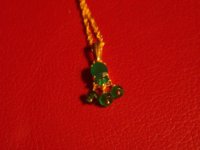I started researching emeralds, hoping that like diamonds there would be a set system for identifying their value. Obviously there are standards such as the color and how clear the stone is, but these qualities are not certified in a set way like diamonds are with very specific specs for each stone.
If this is a significant investment for you, you can (and in my opinion, you *should*) get a certificate for your emerald. GIA provides certificates for emeralds.
The earlier posts gave good questions you should ask the jeweler about any possible enhancements. Fyi, apart from fillings and oilings on emeralds, some jewelers today use resin or wax. (Personally, I would only buy 100% natural stones but that is a very personal preference.)
You may also want to ask where the emerald is from. Although color is the most important factor, the origin will determine the "fair" price of the stone with Colombian emeralds being the most expensive (the most beautiful natural ones will glow from within.)
In terms of price, commercially sold synthetic emeralds cost about 10% vs. its natural counterpart.
Just as benchmark: if you go to a good jeweler in Colombia and buy an excellent natural emerald, prices generally start at USD5,000-8,000 per carat.


